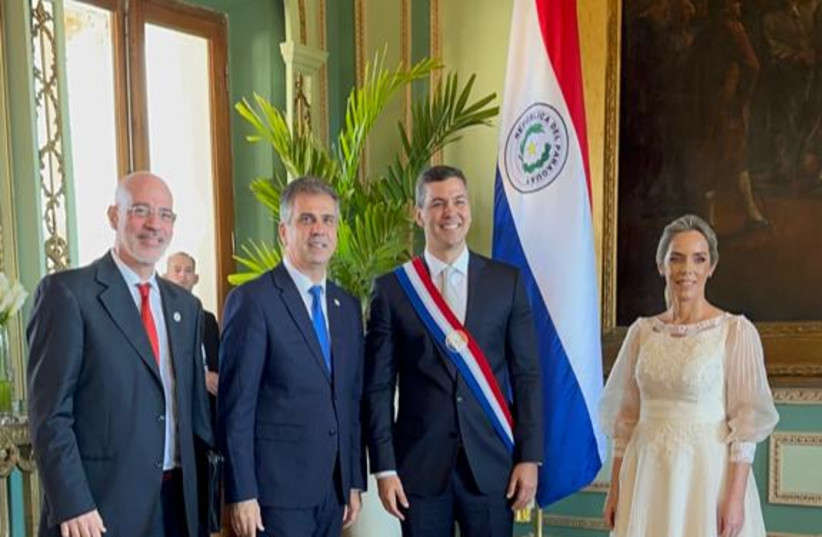After five years of missed opportunities, the potential for a robust strategic partnership between Paraguay and Israel is seemingly back on track. Yet new Paraguayan President Santiago Peña Palacios, who has called himself “Israel’s greatest friend,” has significant issues to address in order to genuinely restore the nations’ friendship and elevate their cooperation to the next level.
Shortly after the inauguration of Peña in mid-August, Foreign Minister Eli Cohen announced that Paraguay would move its Israeli embassy back to Jerusalem within the year. This shift would rectify the perplexing diplomatic episode of 2018, when Peña’s predecessor Mario Abdo Benítez moved the embassy to Tel Aviv after it had been in Jerusalem for a mere five months.
In truth, the embassy was just the tip of the iceberg when it came to the feckless policies of Abdo, who along with former Minister of Interior Federico Alberto González Franco allowed Israel-Paraguay cooperation to virtually disappear and openly supported terrorist financial operations.
A stalled probe into the Venezuelan Emtrasur cargo plane that landed in Paraguay in May 2022 alleged gold trafficking to the Middle East and large illicit cocaine shipments to Germany. During the same month, Israeli Defense Minister Yoav Gallant indicated that there is a gold smuggling operation between Iran and various Latin American countries that is funding Hezbollah’s terrorist activity. Peña’s administration must now confront such forms of collateral damage left by his predecessor.
Economic crisis, geopolitical insecurity, and Argentina’s new membership in the BRICS alliance, joined by Iran and Ethiopia, should make Paraguay a strategic partner of Israel in a volatile South American region that has growing potential to provide agricultural goods to the Middle East and also to Israeli allies such as Azerbaijan in Eurasia.

At the same time, to implement a successful national security strategy and secure his country’s porous borders, it is incumbent upon Peña to make headway on the purchase of defense technology from Jerusalem and ensure intelligence cooperation in order to reduce the presence of Hezbollah in the tri-border area of Argentina, Brazil, and Paraguay as well as to combat the massive financial operations there that benefit Middle East terrorist groups.
Paraguay is the poorest nation in South America, with weak law-and-order institutions that are smothered by neglectful leadership and high levels of corruption. Recently, it was discovered that Paraguay’s national police force has inherited a debt of over $200 million, incurred under the previous administration of Federico Alberto Gonzalez Franco, who had the unbridled courage to visit the United States only two days after leaving his post as minister of interior.
Israeli agro-tech innovation
Given the Russian aggression in Ukraine, the importance of agricultural commodities has become paramount – and if it reverses the tide of its domestic malaise, Paraguay is poised to become a global leader in grain, wheat, and beef exports. The country’s industrial strength can grow further by establishing commercial ties with Israel in agricultural technology. With Israel’s expertise in drones, airspace monitoring is another potential area for cooperation.
In this context, Dario Cesar Lezcano Mendoza – a successful Paraguayan entrepreneur and international public relations expert – has organized various official visits of top government leaders from Asunción to Jerusalem. Over the last five years, despite the obstacles created by the Abdo government, he has introduced to Paraguay more than a dozen products made by various Israeli companies in defense technology and other sectors.
Simultaneously, the Peña government should conduct a thorough nationwide investigation into the alleged illegal gold extractions taking place inside Paraguay that are benefiting terrorist organizations in the Middle East. Various local sources claim that Abdo is the main shareholder in Paraguay’s illegal gold trade, underscoring how his administration significantly harmed the national interests of Israel and the US in Latin America.
It is also the fundamental responsibility of Paraguay’s Attorney General Emiliano Rolón Fernández to investigate Abdo and former Vice President Hugo Adalberto Velázquez Moreno in regard to their ties to international organized crime and terrorism – two inseparable enterprises that hinder Israel’s territorial integrity and economic progress due to the ripple effect from Latin America to the Middle East.
All experience teaches us that the chronic South America-based money laundering operations benefiting Mideast terrorist organizations must be faced unequivocally by local authorities, in a fashion that makes terrorist financiers stay on the run. This strategy can only be successful through close cooperation and strategic synergy between the governments of Paraguay and Israel.
The US State Department and Justice Department prefer to remain distant from the current dark money operations, big tobacco, and narcotics trafficking operations occurring at every corner of Paraguay’s territory. At the dawn of the Peña era, Israel and Paraguay can partner to fill that void, through the implementation of technological tools that can closely monitor the illegal terrorist operations taking place in large swaths of territory spanning Argentina, Brazil, Bolivia, and Paraguay.
When Peña calls himself “Israel’s greatest friend,” there is no reason to doubt his intentions. Yet, words are one thing and actions are another. As such, Peña’s blueprint for Israel-Paraguay relations must entail taking substantive steps to reverse the damage inflicted during the Abdo presidency. At that point, a thriving strategic alliance will be firmly within reach.
The writer is executive director for international relations at National University of the East (UNE) in Paraguay. He is also honorary consul of Azerbaijan in Paraguay.
